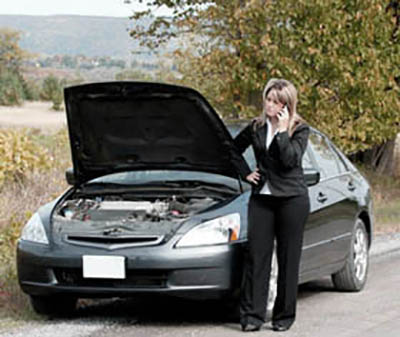
If you’re like most people, you depend heavily on your car. It is the transportation you use to get to and from work, to take care of household and family necessities, and for doctor, dentist and vet appointments. It gets you where you need to go, and it is always there in the event of an emergency that might require a trip to the ER.
When your car has a mechanical breakdown, it can put a huge crimp in your lifestyle, making it difficult or even impossible to get to work and do all of the things you need and want to do. You may be forced to ask friends or family members to give you rides or even take public transportation in order to get where you need to go. If there’s an emergency, your options are limited to calling someone for help or calling an ambulance. And as for the places you merely want to go – well, good luck getting there at all.
It’s one thing to have car trouble and get it fixed in a day or two, but what if the cost is more than you can pay? What if the mechanic is backed up and can’t fix your car for a week? There is a way to protect yourself from unpredictable repair costs and loss of use of your vehicle if repair costs and rental fees don’t fit into your budget.
Can Mechanical Breakdown Insurance Help?
Mechanical breakdown protection is a type of insurance that typically extends the coverage of your existing vehicle manufacturer’s warranty. In addition to covering the cost of repairs on your vehicle, policies may also cover towing in the event of a breakdown, rental car costs, and trip interruption costs. Depending on your policy, other benefits may also be included. Some policies even transfer to another owner if you sell your vehicle.
Mechanical breakdown coverage is not a part of most auto insurance policies, but can be added to the policy for an additional cost, or purchased separately. With mechanical breakdown coverage, you won’t have to worry about putting out hundreds or thousands of dollars when your car breaks down–at least in theory.
Mechanical Breakdown Insurance vs. Extended Warranty
In some ways, a mechanical breakdown insurance policy is similar to an extended warranty. Both types of coverage pay for certain repair costs after the car’s original warranty runs out, both can be added right into the purchase price of the car but breakdown coverage doesn’t need to be), and both are additional coverage that has an additional cost. Warranties don’t typically cover towing or rental costs, however, and warranty companies aren’t as regulated and don’t rely on a rating system to gain customers like insurance companies do, so they may generally be less reliable.

Before You Get Mechanical Breakdown Coverage
This type of insurance can have fairly specific conditions for repairs to be covered, so it is important to read all the fine print before signing up. In fact, some states don’t even regulate it as insurance at all, instead treating it similar to a warranty. There can be frequent exclusions, and any time all the stipulations aren’t followed completely, the claim can be denied. Some common stipulations include regularly servicing and maintaining the vehicle and using the recommended type of gas.
If your issue is considered to be a pre-existing fault, it won’t be covered either. In addition, having multiple problems in a short period of time, called multiple faults, can cost you extra money and cause some repairs not to be covered. Most policies have a deductible of several hundred dollars. It is usually possible to go to any dealership or mechanic you wish, but check your policy for limitations on this as well.
Some Advantages of Mechanical Breakdown Coverage
There are some advantages to mechanical breakdown coverage beyond having repair costs covered. Having coverage may get you better prices on parts and labor when the deductible isn’t met, similar to the way your health insurance policy can get you lower rates on services that you need to pay for. Another advantage of this coverage is that there is no impact on auto insurance premiums for filing claims under a mechanical breakdown policy.
Is Mechanical Breakdown Coverage Worth It?
In all honesty, it may not be worthwhile for everyone to get mechanical breakdown coverage. If you have a newer car, it is likely to be under warranty from the manufacturer in the unlikely event that mechanical breakdown would occur. If you have an older car, on the other hand, the premiums may be too high to make much of a difference because of the increased risk of breakdown. And if you have savings that will allow you to pay for repairs and rental car expenses, there isn’t much point in paying monthly or one-time premiums for this kind of protection.
There are some situations where this coverage makes sense, however. Those with limited income or who have trouble maintaining sufficient savings to cover a major repair may be better off paying premiums than paying for a repair in a few months or years. Parents who are buying a car for a first time driver could add this coverage to be sure that their children won’t get stuck with a large repair bill.
Each vehicle owner needs to carefully consider the costs and benefits of a mechanical breakdown policy and whether it will benefit them. Because these policies are detailed and contain so many exclusions, it is important to be fully informed and make a careful decision that best suits your individual needs.
AIS Auto Insurance can help automobile owners consider whether a mechanical breakdown policy would benefit them and help them find the best option for their coverage. AIS provides quotes for a full range of auto, life and home insurance plans to meet your individual needs.
The information in this article was obtained from various sources. This content is offered for educational purposes only and does not represent contractual agreements, nor is it intended to replace manuals or instructions provided by the manufacturer or the advice of a qualified professional. The definitions, terms and coverage in a given policy may be different than those suggested here and such policy will be governed by the language contained therein. No warranty or appropriateness for a specific purpose is expressed or implied.


